Using Phonics Dominoes to Build Language Skills
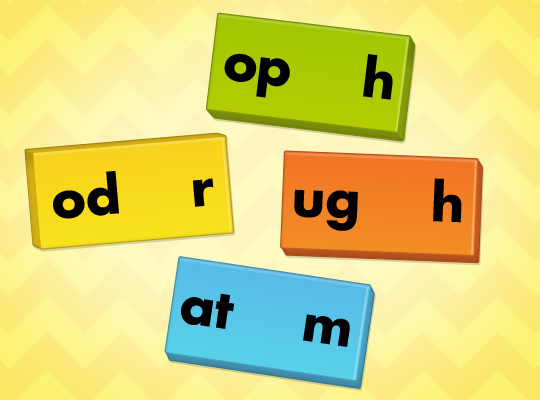
Fun and Interactive Word Building!
Where has this game been all of my life?
Phonics Dominoes is a fantastic way to practice word-building and decoding skills. There are several versions available: Short Vowels, Long Vowels, Blends and Digraphs, Word-Building, and for more advanced students, Sentence-Building dominoes.
In this post, we’re reviewing the Short Vowels version.
These sturdy dominoes come in six bright colors and are the perfect size for small hands. Each tile contains a single consonant and a combination of two or three letters, allowing them to be combined in hundreds of ways. Instructions are provided for five different games. Several of the variations require at least two players, but you can easily adjust the rules so they work for a single student. The suggested age range is 6-9.
Let’s Play “Word Train”!
One way to play Short Vowel Dominoes is Word Train. Let’s play! Pick one player to be the dealer. The dealer starts the game by dealing five tiles to every player, including himself. Everyone then stands their tiles on edge so no one else can see them.

The dealer starts play by placing one tile in the center of the table.

Now it’s time to make a word train! Each player has a chance to make a word by placing one of his tiles before or after the tiles already on the table.
For example, the first player plays one of his tiles to build the word hat.
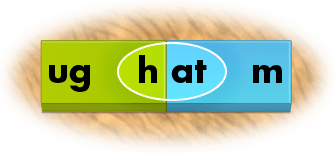
The next player adds her od/r tile and builds the word rug. Now it’s your turn and you play your ub/r tile to build the word rod.

Great job! See how the train gets longer with every turn?
Now it’s your turn again…but look! None of your tiles can be added to the word train!
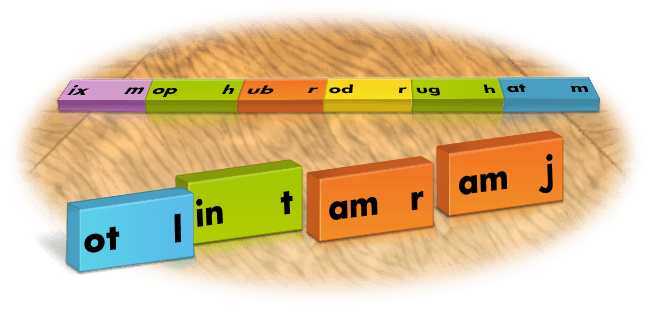
You have to take another tile and add it to your tiles. Your turn is over, but don’t worry—you get to play again in the next round.
The first player to play all his tiles wins the game.
5 Ways to Build Language Skills with Short Vowels Phonics Dominoes
- Sound out words. Using the different word parts on the tiles will provide your kids with lots of practice blending sounds to create words.
- Build vocabulary. Kids can learn new words as they experiment with forming words with the tiles. You can also work with single tiles and encourage your kids to think of as many words as they can using the letters on that tile.
- Practice spelling skills. Kids will have fun finding “real” words to spell such as mop and hat, while avoiding “fake” words such as jod and rix.
- Build word families. Your child can experiment with word families, which are words that follow a similar pattern. Have your child keep adding new beginning consonants to form new words that rhyme.
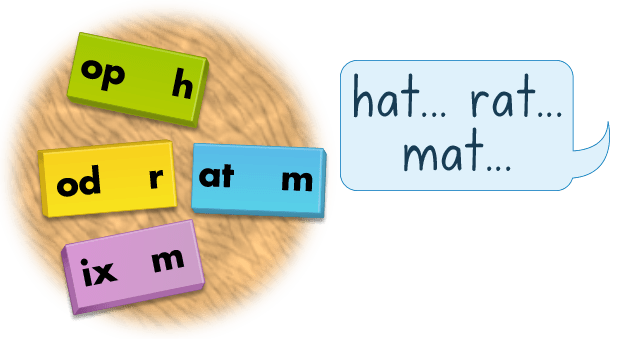
- Play with similarly spelled words. Phonics Dominoes can be especially helpful for Word Guessers because they will have to focus closely on the small variations between similarly spelled words. They’ll learn how changing even one letter of a word changes the meaning.

Notes from Our Game Testers
- Some kids find it fun to make up a silly sentence with the word that was just created.
- Go ahead and create your own games using these tiles. The games in the instructions are a great jumping-off point, but you can tailor them any way you desire.
- As you read the instructions, you may notice that Phonics Dominoes uses a different definition for phonograms than we do in the All About Reading and All About Spelling programs. This difference won’t affect your student or the game play in any way, but you may be interested to know the distinction. Our working definition of phonogram is “a letter or combination of letters that represents a sound” (such as B or CK). The game uses the working definition of word families (such as -AN, -OG, and -UN).
Does your family have a favorite board game that is a fun and “sneaky” way to build language skills? Please share in the comments below!
All About Learning Press, Inc. is a participant in the Amazon Services LLC Associates program, an affiliate advertising program designed to provide a means for us to earn fees by linking to Amazon.com and affiliated sites. All proceeds from our partnership with Amazon.com will be donated to local libraries.




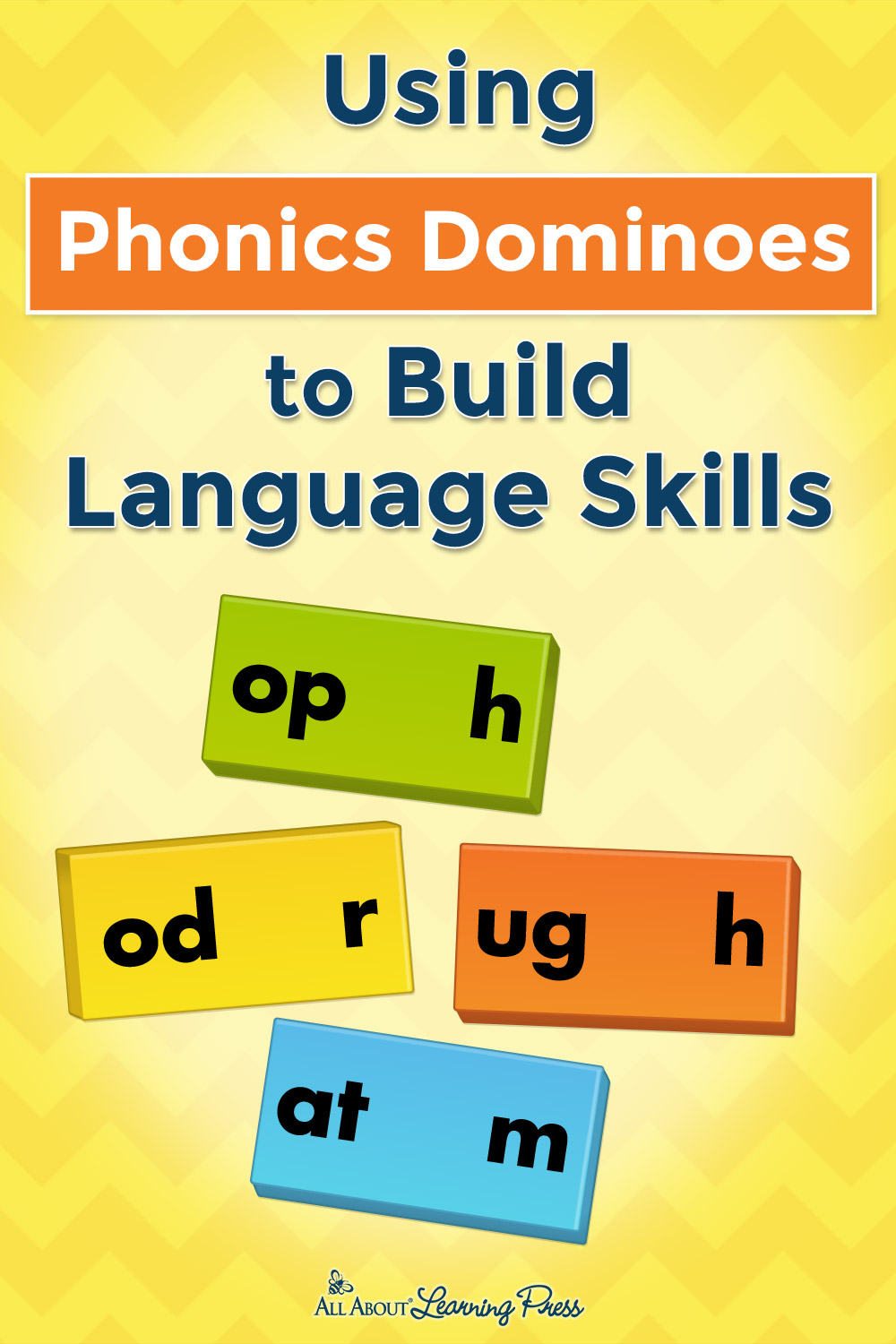








Holly C.
says:My grandson loves the Memory Game and puzzles. I use versions of the first for spelling, rhyming or similar words. The play can involve duplicate words, rhyming pairs, first and last parts, and more. The words can be all in one “field” or in two separate “fields” to make it easier.
I cut words or word pairs apart (using the same pairings above) in interesting shapes. We sound out each part or pairing before finding its mate.
Suvarna Bajpayee
says:Good morning ma’am.
I am Suvarna and my son age 7 is been diagnosed with LD. I just read your blogposts and they are really helpful. My son is somehow able to read phoneic level 1 books. But writing spellings seems to be a herculean task for him. As if he forgets them. I really need your guidance on this. Really thank you and appreciate your efforts.
Robin E.
says: Customer ServiceSuvarna,
Spelling is more difficult than reading. A child only needs to know that C says /k/ to read the word cat. But to spell cat he has to hear the /k/ sound and decide if he should use C or K, or even CK or CH! It’s much more complex.
Because of this, it is often best to teach reading and spelling separately. Students will go ahead in reading and take as much time as they need in spelling.
I think you may find these blog posts helpful:
How to Find a Spelling Program That Works
The “No Gaps” Approach to Spelling
Suvarna Bajpayee
says:Good morning,
Thank you for your sharing your guide lines. I never took both the things separately. Thanks for making things clear. Will definitely read your suggested posts.
Donald Errol Knight
says:This souns like a whole lot of fun!
Debbie Hale
says:I love Scattergories Jr., and for younger students I play some rhyming concentration and rhyming bingo games.
Robin E.
says: Customer ServiceMy family loves Scattergories, so I’ll have to remember the junior version when my grandchildren get a bit older. Thanks for the recommendation, Debbie!
Victoria
says:Great job
Terry
says:Thank you all these great ideas in teaching the kids how to spell, read and form words. I appreciate it very much
Robin E.
says: Customer ServiceYou’re welcome, Terry!
Michelle A
says:This sounds like so much fun! Where can you get word dominoes?
Robin E.
says: Customer ServiceMichelle,
These phonics dominoes are available from Amazon.
Sara Poffenroth
says:Love it
Robin E.
says: Customer ServiceThanks, Sara!
Sarah
says:This is a great idea!
Holly McKinney
says:Love this!!!
Ashley
says:We just went to a museum with a Dyslexia exhibit and they had these dominos! It was so fun!
Robin E.
says: Customer ServiceInteresting, Ashley! Where was this Dyslexia exhibit? I know my family would love to see it as five of the seven of us are dyslexic.
Craig
says:This is a great idea!
Sherry
says:Thank you for this game!
Rachel wright
says:I cant wait to use this
Jennifer
says:Thank you so much for sharing this resource with us!
Robin E.
says: Customer ServiceYou’re welcome, Jennifer!
Rebekah
says:My daughter loves the fun games included with all about learning materials. So fun!
Margarita Diaz
says:I honestly had no idea these existed?Going to check them out!!
Robin E.
says: Customer ServiceGlad to have helped inform you these exist, Margarita! I hope you enjoy them.
Amy
says:We love to play Boggle.
Robin E.
says: Customer ServiceBoggle is great, Amy! We have a blog post about it, Using Boggle to Build Language Skills.
Christina
says:Such a great idea!
Barbara
says:I enjoyed this article. We love using things like word rods, so phonics dominos is definitely something I could see adding to our toolbox!
Audra
says:Please tell us about word rods.
Bryanna McManus
says:GREAT IDEAS!
Jessica
says:What great idea!
Ruth
says:This is brilliant!
Colleen
says:What a fun way to learn spelling!
Brit
says:Great game for practicing those spelling skills!
Jennifer
says:Good Idea!
Tori Hershey
says:The games is what makes this so fun for kids
Elizabeth John
says:This is such a fantastic idea! My young son would love playing this and not even realize he is “doing school”. We love your programs and he is doing so well in them. Thank you!
Robin E.
says: Customer ServiceI’m glad to hear that your son is doing so well, Elizabeth!
Beth C.
says:What a fantastic resource! Thank you for sharing this.
Jessica
says:This looks like a fun game that is also quite profitable for learning. Thanks for the idea!